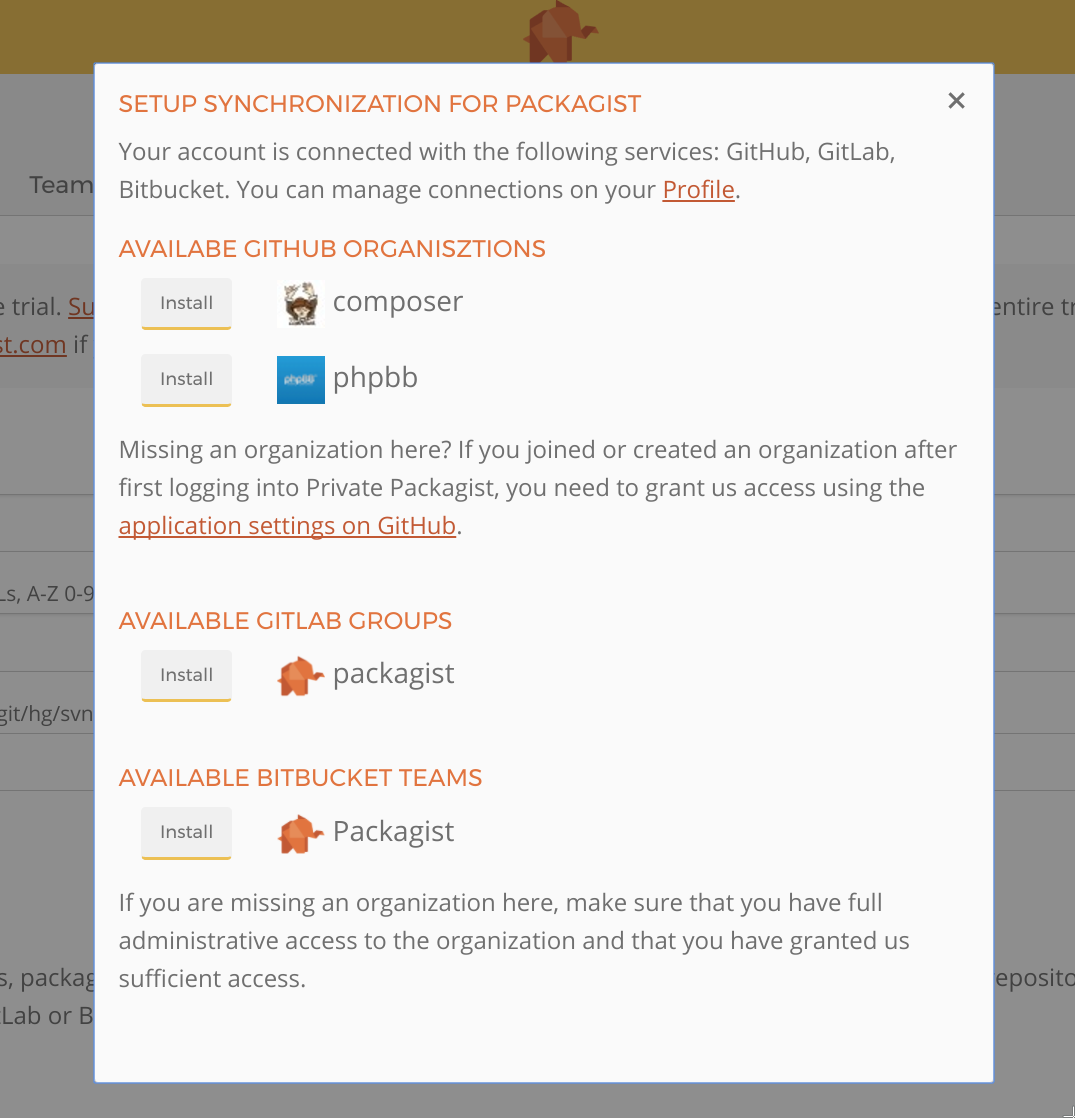GitHub, Bitbucket, GitLab and Other Integrations
Synchronization of Users, Teams, Permissions and Repositories
Documentation
- Quick Start Guide
- Private Networks and Firewalls
- Using Private Packagist in a Composer project
- API Documentation
- Security Monitoring
- Update Review
- Synchronization FAQ
- Composer Authentication
- Cloud Changelog
Features
- Private Composer Packages
- Mirroring Composer Packages
- GitHub, Bitbucket, GitLab and Other Integrations
- Security Monitoring
- Update Review
- Dependency License Review
- Subrepository Setup
- Vendors: Customer Setup
Articles
Private Packagist Self-Hosted
- Self-Hosted Installation Guide
- Integration Setup
- Replicated Native (deprecated)
- Self-Hosted Changelog
Composer has broad support for version control systems, code hosting platforms and authentication protocols. As a consequence Private Packagist is compatible with all the same systems and platforms, namely Git, Mercurial or Subversion using SSH access, HTTP Basic Auth over SSL, or their native protocols.
To simplify the initial setup and maintenance of a Private Packagist account, we offer optional synchronization for GitHub organizations, Bitbucket workspaces and GitLab groups. This integration keeps teams, their members, and access permissions in sync with a matching GitHub organization. So you only need to manage users and permissions in a single place.
You can log into Private Packagist using an account on GitHub.com, Bitbucket.org, or GitLab.com. If you already have an account you can connect these services to your existing account on your profile page.
You can then either create a new organization directly synchronized with a GitHub organization, Bitbucket workspace or a GitLab group, or you can enable synchronization for an existing Organization in Settings.

Apart from synchronizing teams, users, and permissions, setting up the integration will simplify the addition of new packages to your Composer repository. When you create a new repository on GitHub, Bitbucket, or GitLab, it will be added as a Composer package automatically if it contains a composer.json file. If you’d like to add existing repositories as packages, you can do so with the click of a button on the Packages tab in your organization.
Update web hooks notifying Packagist of new code pushes will be installed in the background, and credentials to access the package will be configured automatically.
Integrations
Private Packagist integrates with the following systems:
GitHub
- OAuth: Users authenticate on Private Packagist with their GitHub accounts
- Synchronization:
- Keeps teams, their members, and access permissions in sync with your GitHub organization
- Code Credentials: GitHub App or GitHub API Token
- Webhooks: Code changes, releases, created repositories, team creation or member changes
GitHub Enterprise
- OAuth: Users authenticate on Private Packagist with their GitHub accounts. Follow this setup for Cloud plans or this setup for Self-Hosted.
- Synchronization:
- Keeps team members and access permissions in sync with your GitHub Enterprise organizations
- Code Credentials: GitHub API Token
- Webhooks: Code changes, releases, created repositories, team creation or member changes
Bitbucket Cloud (bitbucket.org)
- OAuth: Users authenticate on Private Packagist with their Bitbucket accounts
- Synchronization:
- Keeps groups, their members, and access permissions in sync with your Bitbucket workspace
- Code Credentials: Bitbucket API Key or Bitbucket App Password
- Webhooks: Code changes and releases
Bitbucket Data Center / Server
- OAuth: Users authenticate on Private Packagist with their Bitbucket Data Center / Server accounts. Follow this setup for Cloud plans or this setup for Self-Hosted.
- Synchronization:
- Keeps users and access permissions in sync with your Bitbucket Server projects
- Individual collaborators aren't supported
- Code Credentials: personal access token which are available since Bitbucket Server 5.5 or username and password for older versions
- Webhooks: Code changes and releases
GitLab
- OAuth: Users authenticate on Private Packagist with their GitLab accounts
- Synchronization:
- Keeps teams, their members, and access permissions in sync with your GitLab groups
- Individual collaborators aren't supported
- Code Credentials: GitLab API token
- Webhooks: Code changes and releases
GitLab (Self-hosted)
- OAuth: Users authenticate on Private Packagist with their GitLab accounts. Follow this setup for Cloud plans or this setup for Self-Hosted.
- Synchronization:
- Keeps teams, their members, and access permissions in sync with your GitLab groups
- Individual collaborators aren't yet supported
- Code Credentials: GitLab API Token
- Webhooks: Code changes and releases
AWS CodeCommit
- Webhook:
- Users need to create an AWS CodeCommit Trigger using the generic hook URL from the package page
- Code changes are available automatically. For releases, you need to select "All repository events" for the events type.
Azure DevOps
- Code Credentials: Either create a personal access token on Azure and store it as HTTP Basic credential or grant us access via SSH key
- Webhooks:
- Users need to create a Service Hook using the generic hook URL from the package page
- Select the "Code pushed" event (includes commits and tags) and the repository that matches the package. No authentication or additional configuration is necessary.
Start Free Trial
Login to create an organization and start your free trial!

 Bitbucket
Bitbucket
 GitHub
GitHub
 GitLab
GitLab
 Log in or register with email/password
Log in or register with email/password